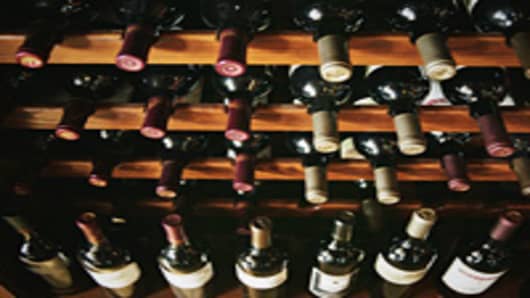$230,000 can buy you a brand new Ferrari Italia or a two-week stay at the Ritz in Paris. Instead, a private Asian bidder at a recent Sotheby's fine-wine auction in Hong Kong chose to spend it on a bottle of Bordeaux. The sale gave the 1869 Chateau Lafite vintage instant headlines and the distinction of the most expensive bottle of wine in the world.
The splurge continued into day two of the auction, where South Korean conglomerate SK Networks sold 624 lots of Bordeaux wines in the span of two hours for a princely sum of $10 million.
Asian investors are becoming increasingly sophisticated and the blockbuster wine sales underscore their growing taste for alternative investments. It helps that wine has shown to be lucrative investments in the last decade: the London-based Live-ex 100 index, which tracks the 100 most sought-after wines, is up 234 percent over the last nine years; compared to the 15 percent gain by the FTSE 100 Index.
While auctions allow collectors to get their hands on coveted vintages, they aren't the best approach for investors hoping to make money, according to renowned wine investor Peter Lunzer. "Why would anybody pay up a large amount of money for something which is after all just a commodity," says Lunzer, CEO of Lunzer Wine Investments.
A case of 12 bottles of Chateau Lafite 2009 , for example, sold for $69,000 at the Hong Kong auction, but it's quoted at just $18,000 on Liv-ex website. On top of inflated auction prices, Lunzer says buyers have to also pay a 21 percent fee to the auction house. Built into the price is a further 10 percent premium that the seller of the wines pays to the auction house, he added.
For investors, there are essentially two ways to buy wine: either physically acquiring the bottle, like at auctions, or buying into a wine fund.
The advantages of wine funds are that the bottles tend to be bought at lower-than-market-rate prices and are stored and insured professionally by the fund managers. The managers also have the expertise and contacts to offload the collection commission-free to hotels and private buyers when the time comes for liquidation.
But wine funds can be expensive and require high minimum investments. Lunzer Wine, for example, charges a 2 percent management fee and a 20 percent performance levy on returns, after a hurdle of 6 percent. It also requires a minimum investment of $162,000 (GBP 100,000). The U.K.-based fund opened in 2009 and it currently manages assets worth $12.8 million.
For individual investors who want to go it alone, Lunzer says the best way is to buy the most expensive wines of a very small supply from a reputable source. Individuals can also buy wines from merchants but Lunzer recommends checking online resources such as Liv-ex and wineseacher.comto cross check prices.
Investors should also be aware of the risks. Wine prices are subject to global macroeconomic downturns; prices dropped significantly in 2008 due to the global financial crisis. And like most other commodities, wine prices are inversely related to the availability of the wine. So if the rate of consumption is not as high as expected, prices could also depreciate.


